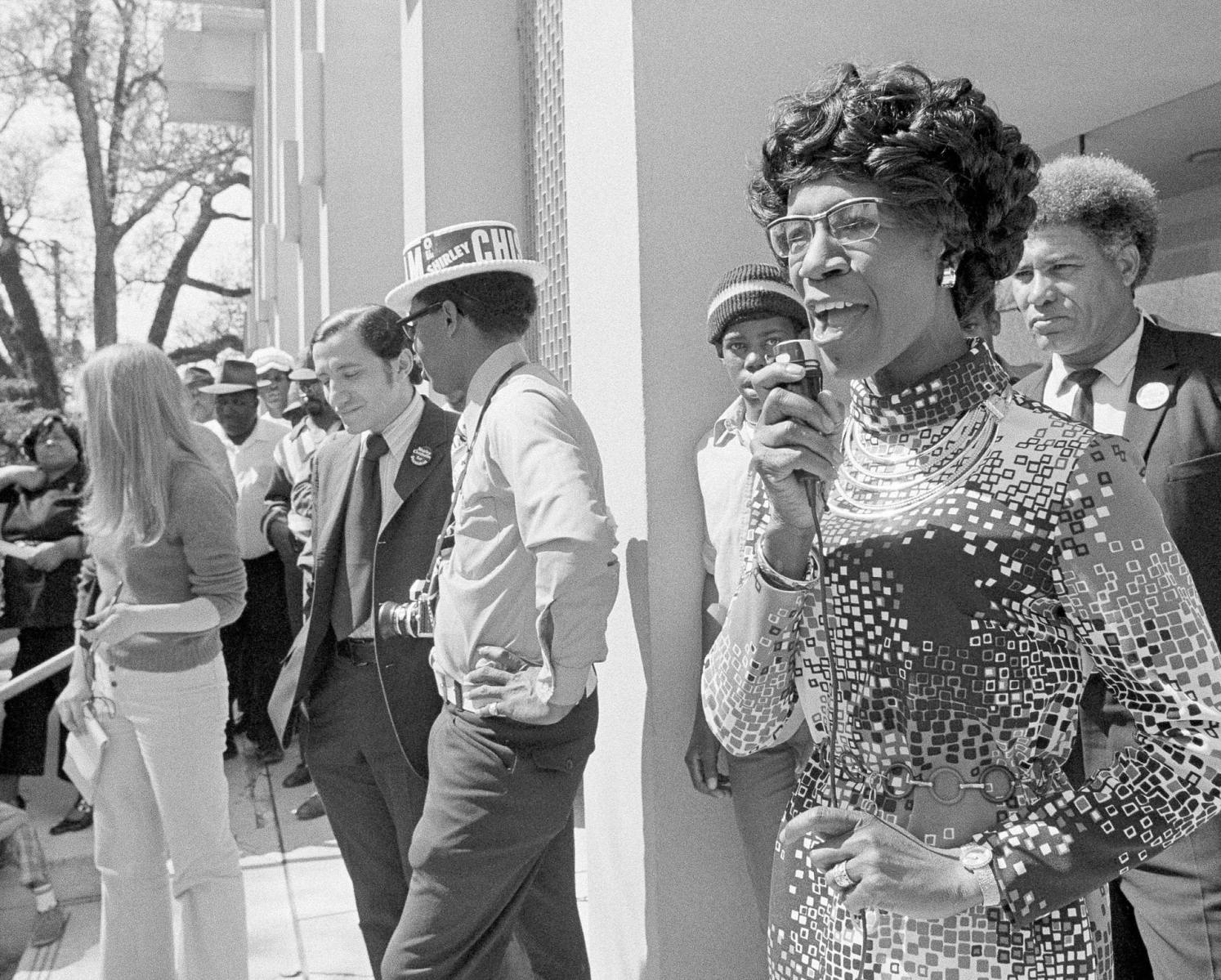Is there a meaningful place for Black justice movements and electoral politics to entwine from the grassroots up? The Movement for Black Lives, an “ecosystem” of 150 organizations nationwide that includes Black Lives Matter, has spent this year responding to this core question through federal legislation, protests, and their own delegate-based political convention, which came on the heels of the Democratic and Republican iterations.
Except this political coalition will not be endorsing anyone ahead of the November elections. The Movement for Black Lives unequivocally champions limiting President Donald Trump to a single term, but their stake is not in the fight for the White House. Rather, it lies in endorsing a set of shared policies, principles that improve Black life.
“What we have to push on all of these candidates is their acceptance of the issues, of the solutions, of the policies that we want to see implemented,” Rukia Lumumba, a co-director of the Movement for Black Lives’ Electoral Justice Project, said. “This idea that everything is candidate based is not a reality for our community, because candidate-based solutions have not led to our needs being met over and over again.”
Held late last month, the Black National Convention (BNC), modeled after the National Black Political Convention of 1972, moved online when its slated event space in Detroit was turned into a hospital to treat COVID-19 patients. Ahead of the convention, 500 delegates from across the country engaged in virtual “teach-ins” about six core frameworks that also guided the BNC: queer Black feminism, environmental/land justice, racial capitalism, abolition, international solidarity/global liberation, and ending patriarchal and intercommunal violence.
This commitment to inclusivity set the event apart from other social justice movements of late. On August 28, just hours ahead of the BNC, Rev. Al Sharpton led the “Get Your Knee off Our Necks” Commitment March at the Lincoln Memorial to commemorate the lives lost to police violence in recent years. On the sweltering day in Washington, D.C., family members addressed a crowd, pledging to continue fighting for justice. However, the event focused predominantly on Black men, with little mention of the increasing number of Black women, trans and nonbinary people who are also impacted by police violence.
Raquel Willis, a writer and transgender activist and BNC panelist, said she felt heartened that this event went differently.
“I hope that what happened at the BNC will be a signal to those of the old guard of the civil rights movement that they need to be listening more and collaborating more with younger, Black and also more progressive folks in our community,” Willis said on MSNBC after the convention.
For Lumumba, an inclusive, intersectional convention was integral in telling the full story of Blackness.
“We cannot ignore or leave out any part of our struggle, which means we can’t ignore disability justice because we want to see police violence against cisgender men end now,” Lumumba told The 19th. “We can’t ignore that patriarchy is real in this country and sexism is real and misogyny is real and just ignore the plight of Black women who have been consistently killed since our arrival to this continent. We have to acknowledge all of it.”
At the core of this work that led to the convention, Lumumba said, there exists a “deep, deep love for Black people.”
But this kind of love is not easy, Lumumba added.
“A lot of difficult conversations got us to where we were with the BNC,” she said. “When you’re trying to tell the whole story of Black people, there’s so much to tell. How do you even narrow that down to ensure you’re as inclusive as possible? We really tried that, and recognized that inclusivity is going to be our freedom.”
Black politics had a big year in 1972. Shirley Chisholm kicked it off with a presidential campaign, three years after becoming the first Black woman elected to Congress. Running under the banner of her now-famous slogan, “Unbought and unbossed,” Chisholm’s campaign for the Democratic nomination centered on equality for women, health care for all, and comprehensive early childhood education.
“I am not the candidate of Black America, although I am Black and proud,” Chisholm said in announcing her candidacy at Concord Baptist Church in Brooklyn. “I am not the candidate of the women’s movement of this country, although I am a woman and I’m equally proud of that. I am the candidate of the people of America.”
Chisholm said she had not been favored in political circles because she was independent and forthright on issues important to her. If her candidacy did nothing else, she said, it would begin to make America become aware of the fact that people will be judged on the basis of their capacities, abilities and merits, and not on the basis of the pigmentation of their skin.
“A catalyst for change has to be able to withstand the insults, the humiliation, the abuses and the slurs,” Chisholm said on the campaign trail. “What’s wrong with my running for president of this country?”
Three months after Chisholm launched her campaign, eight thousand black people descended on Gary, Indiana, for the National Black Political Convention, seeking a way to cultivate Black political power as an organized coalition. Knowing that the men who chaired the event would not endorse her, Chisholm did not attend.
Sen. Barbara Lee, who worked on Chisholm’s 1972 campaign, was among the crowds in Gary. “We tried to get an endorsement from the Black Political Convention delegates for Shirley Chisholm for president,” she said in the Chisholm-focused episode of 2016 PBS series The Contenders. “We couldn’t even get it there. The guys had it so sewed up.”
There were other tensions, too. The NAACP pulled out because White people were kept from attending. During the convention there were large debates about segregation, busing and Palestine. Afterwards, some Black political figures disagreed with aspects of the 58-page National Black Political Agenda.
State delegations arrived with an array of proposals across the political spectrum. The Mississippi delegation shared its vision for the Republic of New Afrika, a separatist movement with the goal to create an independent nation for Black people in Bolton, Mississippi. “Free the Land,” their freedom cry, is still championed today.
Lumumba’s father, Chokwe, served as a vice-president for this organization for the Republic of New Afrika. Lumumba remarked that her father totally evolved his thinking around the role of electoral politics as a means for freedom. His first time voting was for himself at the age of 61, when he ran for Jackson city council. In 2013, he voted for himself again during his successful bid for mayor in 2013. He only ran because his community urged him to, his daughter said. Chokwe Lumumba died in office less than a year into his term — his youngest son and namesake took up this legacy in 2017. From her dad, Lumumba realized it was possible to see real change in your lifetime, she said. “Our freedom is imminent.”
Nearly a half-century later, Movement for Black Lives’ Black National Convention sought to honor that 1972 spirit. Blackness is not a monolith, the host, actor and activist Angelica Ross said, prefacing her intro with a disclaimer that not everyone will agree with everything at the convention. The three-hour event, produced by award-winning filmmaker dream hampton, tackled topics of toxic masculinity, bias against Black immigrants, and housing insecurity among a vast number of other topics.
Out of the convention came the Vision for Black Lives 2020, a comprehensive policy agenda timed ahead of the November election. Among the demands are a call for a federal minimum wage of at least $15 an hour, equal pay for Black women, an end to toxic dumping in Black communities, eliminating debt and discriminatory lending to Black farmers, reparations for slavery, repealing the 1994 crime bill, removing police and law enforcement from schools and “other sites where state violence against Black women, youth, trans, intersex, and gender-nonconforming people is common.”
The core of the vision is focused on local impact. In 2017 Kayla Reed and Jessica Byrd met while working to elect Tishaura Jones to become the next mayor of St. Louis. When Jones lost by less than 900 votes, they brainstormed how to build a community of Black electoral activists. At the same time, Lumumba was running her brother’s successful mayoral campaign that hinged on making Jackson, Mississippi, the “most radical city on the planet.” The three women founded the Electoral Justice Project to find a way to achieve people-led governance across the nation.
Hyper-local change is felt more immediately — police violence, for example, has been a nationwide constant no matter who’s president. A top-down approach in which directives, law changes, policies are coming from the federal government is slow where local change is rapid, Lumumba said
“Change is really rooted from the grass roots up,” Lumumba said.
With that philosophy in mind, the Electoral Justice Project drafted federal legislation — the Breathe Act — to propose divesting federal funding from the criminal-legal system and placing it into localized grants for education, health care, environmental justice and decarceration efforts to incentivize non-punitive, community-led approaches to public safety.
The Breathe Act seeks to make sweeping changes to the carceral system by eliminating electronic monitoring systems, abolishing mandatory minimums and three-strikes laws, and closing all federal prisons and immigration detention centers. Reps. Ayanna Pressley and Rashida Tlaib spoke out in support of the “bold” legislation in early July, but it is not actively on the floor.
“We are working to ensure that [the Breathe Act] can be applied on the local level, the hyperlocal level, in your state, as well as in your municipalities because we know that that’s where you’re going to actually feel the impact of that policy,” Lumumba said.
Less than a decade ago, the mere utterance of “Black Lives Matter” alone was almost taboo. Since the deadly Unite the Right Rally in Charlottesville, Virginia, support for Black Lives Matter has grown almost 10 percent, according to polling from Civiqs.
In Lumumba’s mind, that’s a win, and it’s important to not only focus on demands, but success. Her home state of Mississippi removing the Confederate battle emblem from its canton? That’s a win. Los Angeles diverting funds from its $3 billion police budge? Progress. Professional athletes speaking up against police brutality? A testament that protests and taking to the streets works.
“It is the wins that also keep us strong and keep us in this fight,” she said.
Correction: A previous version of this article misstated the first time Chokwe Lumumba voted.






